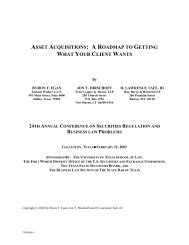fiduciary duty issues in m&a transactions - Jackson Walker LLP
fiduciary duty issues in m&a transactions - Jackson Walker LLP
fiduciary duty issues in m&a transactions - Jackson Walker LLP
Create successful ePaper yourself
Turn your PDF publications into a flip-book with our unique Google optimized e-Paper software.
By stat<strong>in</strong>g that they “careful[ly] deliberat[ed],” the Board was represent<strong>in</strong>gto the shareholders that it had considered the Sales Process on its objective meritsand had determ<strong>in</strong>ed that the Reclassification would better serve the Company thana merger. * * * [This] disclosure was materially mislead<strong>in</strong>g.The Reclassification Proxy specifically represented that the [company]officers and directors “ha[d] a conflict of <strong>in</strong>terest with respect to the[Reclassification] because he or she is <strong>in</strong> a position to structure it <strong>in</strong> a way thatbenefits his or her <strong>in</strong>terests differently from the <strong>in</strong>terests of unaffiliatedshareholders.” Given the defendant fiduciaries’ admitted conflict of <strong>in</strong>terest, areasonable shareholder would likely f<strong>in</strong>d significant—<strong>in</strong>deed, reassur<strong>in</strong>g—arepresentation by a conflicted Board that the Reclassification was superior to apotential merger which, after “careful deliberations,” the Board had “carefullyconsidered” and rejected. In such circumstances, it cannot be concluded as amatter of law, that disclos<strong>in</strong>g that there was little or no deliberation would notalter the total mix of <strong>in</strong>formation provided to the shareholders.* * *We are m<strong>in</strong>dful of the case law hold<strong>in</strong>g that a corporate board is notobligated to disclose <strong>in</strong> a proxy statement the details of merger negotiations thathave “gone south,” s<strong>in</strong>ce such <strong>in</strong>formation “would be [n]either viably practical[n]or material to shareholders <strong>in</strong> the mean<strong>in</strong>gful way <strong>in</strong>tended by … case law.”Even so, a board cannot properly claim <strong>in</strong> a proxy statement that it had carefullydeliberated and decided that its preferred transaction better served the corporationthan the alternative, if <strong>in</strong> fact the Board rejected the alternative transactionwithout serious consideration.Also <strong>in</strong> 2009, <strong>in</strong> Pfeffer v. Redstone 97 <strong>in</strong> a shareholder breach of <strong>fiduciary</strong> <strong>duty</strong> classaction aga<strong>in</strong>st a corporation’s Board and controll<strong>in</strong>g shareholder after the corporation divesteditself of its controll<strong>in</strong>g <strong>in</strong>terest <strong>in</strong> a subsidiary by means of a special cash dividend followed byan offer to parent company stockholders to exchange their parent stock for subsidiary stock, 98 theDelaware Supreme Court expla<strong>in</strong>ed that it was not a breach of the <strong>duty</strong> of candor to fail todisclose <strong>in</strong> the exchange offer prospectus an <strong>in</strong>ternal cash flow analysis which showed that thesubsidiary would have cash flow shortfalls after the <strong>transactions</strong>, but which had been prepared bya lower level employee and never given to the Board:For the Viacom Directors to have either misstated or failed to disclose thecash flow analysis <strong>in</strong> the Prospectus, those directors must have had reasonable9798___ A.2d ___, 2009 WL 18887 (Del. 2009).The Court found the exchange offer to be purely voluntary and non-coercive, and not to require entire fairness revieweven though it was with the controll<strong>in</strong>g stockholder. Further, s<strong>in</strong>ce there was no representation that the exchange ratiowas fair, there was no <strong>duty</strong> to disclose the methodology for determ<strong>in</strong><strong>in</strong>g the exchange ratio, as would have beennecessary to ensure a balanced presentation if there had been any disclosure to the effect that the exchange ratio wasfair. As the exchange offer was non-coercive and voluntary, the parent had no <strong>duty</strong> to offer a fair price. Theprospectus disclosed that the Boards of parent and subsidiary were not mak<strong>in</strong>g any recommendation regard<strong>in</strong>g whetherstockholders should participate <strong>in</strong> the exchange offer and were not mak<strong>in</strong>g any prediction of the prices at which therespective shares would trade after the exchange offer expired.5446095v.130
















